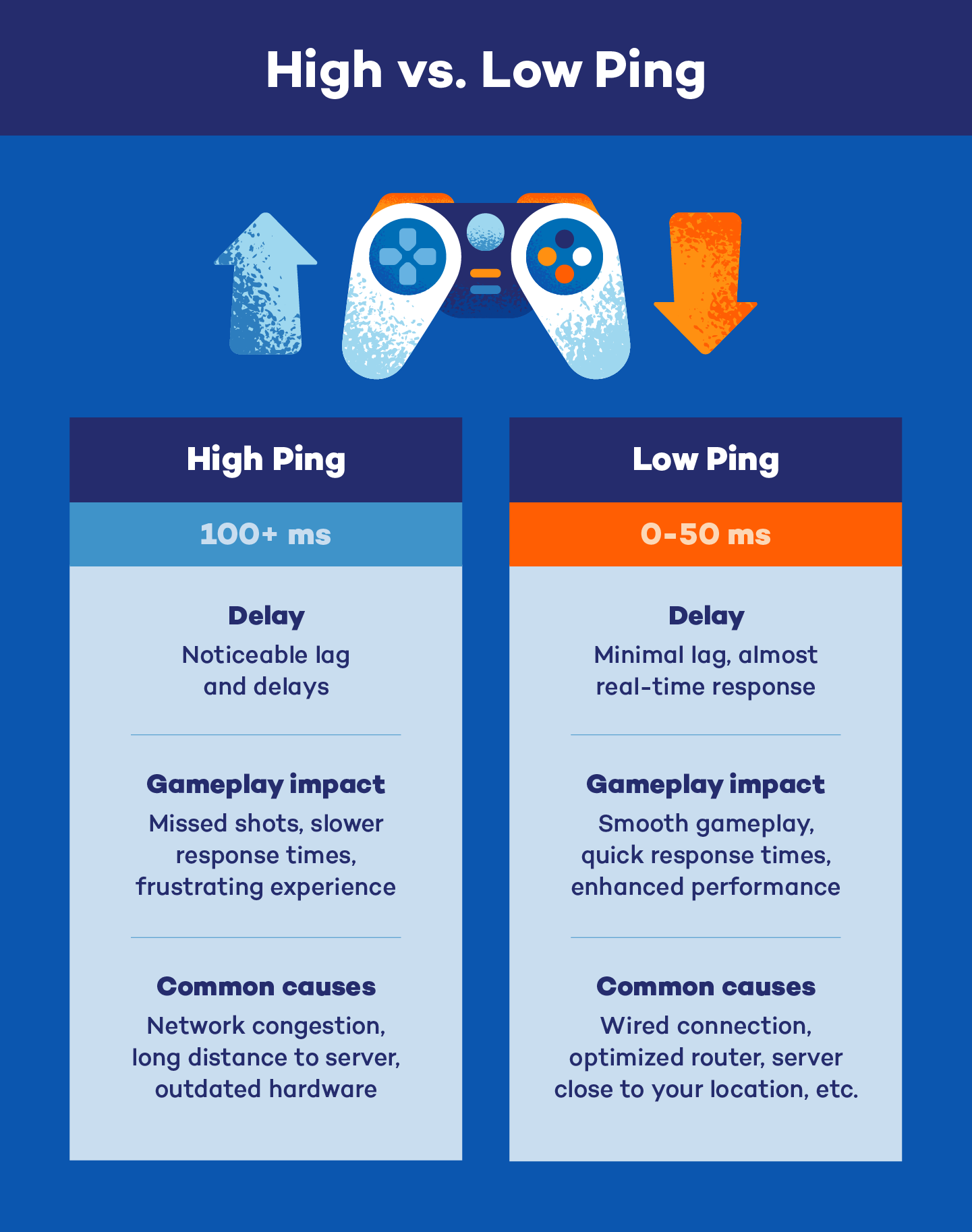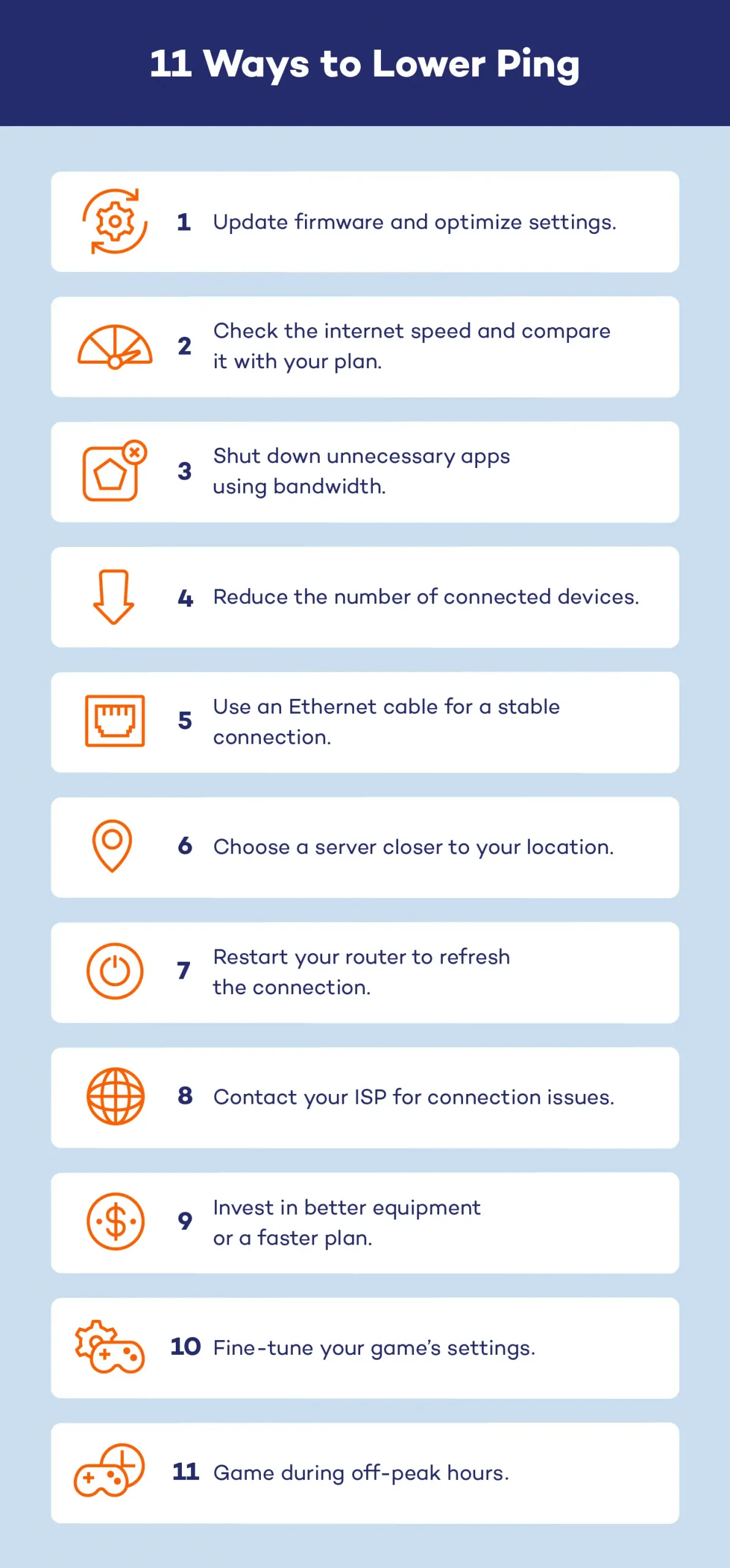If you’ve ever experienced delays during a gaming session, you’ve probably wondered how to lower ping. Ping is essentially the time it takes for data to travel from your device to a server and back. In online gaming, low ping is crucial — the lower the ping, the quicker your commands are executed, making your experience smooth and responsive.
But when ping is high, you’ll notice delays between your actions and what happens on screen. This lag can make gaming frustrating, causing missed shots, poor performance and a lack of control. And no one likes to lose a match because of something as avoidable as high ping.
We’ll walk you through 11 practical tips to lower your ping, boost your online performance and enjoy smoother gameplay.

What Is Ping?
Ping is a crucial term for online activities, especially gaming. At its core, ping measures the time it takes for data to travel from your device to a server and back again. Think of it like sending a message to a friend and waiting for their reply. The quicker the reply, the lower your ping.
- In gaming, a low ping means that your actions are communicated to the game server almost instantly, leading to smoother gameplay and a more responsive experience.
- On the flip side, a high ping means delays, where you might see your actions lag behind, making it harder to react quickly in fast-paced games.
Lowering your ping can make a big difference in how enjoyable and competitive your console or mobile gaming sessions are.
What Causes High Ping?
High ping can be a real game-changer — often not in a good way. Here are some common culprits behind that frustrating delay:
- Network congestion from multiple devices: If multiple devices are using the same network, they can compete for bandwidth, leading to higher ping. Think of it as too many people trying to use a single lane on a highway.
- Distance to game server: The farther away you are from the game server, the longer it takes for data to travel back and forth. Imagine sending a letter across the country versus just across town.
- Outdated router or hardware: If you’re using old or outdated networking equipment, it can slow down your connection. Upgrade to a modern router to reduce ping.
- Background applications consuming bandwidth: Applications running in the background, like streaming services or downloads, can hog bandwidth and increase your ping. Make sure to close these apps while gaming.
- High internet traffic during peak hours: Internet traffic tends to spike during peak hours, which can slow down your connection. This is similar to heavy traffic on the roads during rush hour.
Identifying these factors is the first step in fixing what causes high ping and getting back to smooth, lag-free gaming.
How to Lower Ping: 11 Tips
By addressing common issues and optimizing your setup, you can reduce delays and enjoy smoother gameplay. Here’s how to start improving your connection:
- Inspect your router configuration
- Perform an internet speed test
- Close unnecessary background applications
- Limit the number of devices on your network
- Switch to a wired (Ethernet) connection
- Connect to a different server
- Reboot your router
- Reach out to your internet provider
- Upgrade your router or internet plan
- Fine-tune your game’s settings
- Game during off-peak hours
1. Inspect Your Router Configuration
Your router plays a crucial role in your network’s performance, so it’s worth taking the time to inspect and optimize its settings.
- Start by updating your router’s firmware so you can benefit from the latest improvements and security fixes.
- Next, configure the Quality of Service (QoS) settings, if available, to prioritize gaming traffic over other types of data. It can help reduce delays and provide a smoother gaming experience.
- Check your router’s channel selection. Routers operate on different channels, and interference from neighboring networks can cause performance issues. Switch to a less congested channel to improve connection stability.
Finally, consider disabling unnecessary features like guest networks or beamforming that might be impacting your network’s performance.
2. Perform an Internet Speed Test
By running an internet speed test online, you can measure your download and upload speeds and identify what causes high ping. Simply compare the results to your internet service plan to see if you’re getting the speed you’re supposed to.
If you find that your speed is lower than expected, there might be issues with your internet connection or even a need for an upgrade. Regular speed tests are useful for monitoring your connection quality and addressing problems that could contribute to high latency and lag in gaming.
3. Close Unnecessary Background Applications
You might already know that background applications can silently consume bandwidth, which can increase your ping. When multiple apps or programs are running, they compete for network resources, leading to higher latency and lag in gaming. To address this, close any applications that are not needed during your gaming sessions.
Also, check for software that may be using your network in the background, such as streaming services, file downloads or even automatic updates. By closing these apps, you can free up bandwidth and improve overall online performance.
4. Limit the Number of Devices on Your Network
Too many devices connected to your network can cause congestion and increase your ping. Each device that connects to your network uses bandwidth, which can lead to high latency and lag in gaming.
To improve your connection, try limiting the number of devices connected at any given time. Disconnect devices that aren’t in use, and prioritize your gaming device to ensure it gets the most bandwidth. This can help reduce network congestion and lower your ping, which means a more responsive and enjoyable gaming experience.
5. Switch to a Wired (Ethernet) Connection
Switching from a wireless connection to a wired Ethernet connection is one of the most effective ways to lower your ping. Wi-Fi signals can be affected by interference and signal strength issues, leading to high latency and lag in gaming. An Ethernet cable provides a direct, stable connection to your router, reducing the chances of delays.
A wired connection also ensures a more consistent and reliable network performance. If you’re looking to improve your connection and minimize interruptions, investing in an Ethernet cable could be a game-changer — literally.

6. Connect to a Different Server
Sometimes, high ping can be a result of connecting to a server that is geographically distant from you. Game servers are often located in various regions, and connecting to a server closer to your location can significantly lower your ping.
Check the server selection options in your game and choose one that is geographically closer to you. This reduces the distance your data has to travel, which helps decrease latency and improve overall performance. Connecting to a more optimal server is a practical way to address issues like high ping and lag in gaming, resulting in a smoother and more responsive gaming experience.
7. Reboot Your Router
Rebooting your router is a simple yet effective way to tackle issues related to high ping and lag in gaming. Over time, routers can become bogged down with temporary files, memory leaks or connectivity glitches. Restarting your router can help clear these issues and refresh your connection.
To reboot your router, simply turn it off, wait for about 30 seconds and then turn it back on. Doing this can help resolve minor connectivity problems and improve your network’s performance. Regularly rebooting your router can also prevent long-term issues and help maintain a stable connection with lower latency.
8. Reach Out to Your Internet Provider
If you’ve tried all the tips and still experience high ping, it might be time to contact your internet service provider (ISP). There could be issues with your connection that are out of your control, such as network problems or service outages.
When reaching out to your ISP, ask about any ongoing issues in your area. Sometimes, a simple adjustment can resolve connectivity problems and reduce your ping. That said, your ISP will be able to provide better insights into what causes high ping and offer solutions to improve your overall internet performance.
9. Upgrade Your Router or Internet Plan
If your current router is outdated or if your internet plan doesn’t meet your needs, upgrading could make a significant difference. Newer routers offer improved technology and better performance, which can help reduce high ping and latency.
Similarly, upgrading to a higher-speed internet plan can provide the bandwidth necessary to support multiple devices and intensive yet safe online activities. These improvements can lead to a more stable connection, helping you achieve lower ping and a smoother, more responsive gaming experience.
10. Fine-Tune Your Game’s Settings
Adjusting in-game settings can also impact your ping. Some games allow you to configure settings that can help reduce lag in gaming. For instance, lowering the graphics settings or disabling certain features like shadow quality or anti-aliasing may ease the load on your network and improve responsiveness. Check your game’s options to optimize settings for the best performance.
11. Game During Off-Peak Hours
Internet traffic can be heavier during peak hours, which can lead to higher ping. Try scheduling your gaming sessions during off-peak times when fewer people are online. This can help reduce network congestion and lower your latency, making your gaming experience smoother and more enjoyable.
While optimizing your connection can significantly improve your ping and gaming experience, protecting your privacy while gaming is also crucial. You can use a virtual private network (VPN) that not only enhances your online security but can also help mask your IP address and keep your data private. Using a VPN offers an extra layer of protection that ensures you can game securely while enjoying reduced latency and better performance.
How to Lower Ping FAQ
Understanding ping is essential for optimizing your gaming experience, but you might have some specific questions about it. Here are answers to common queries that can help clarify how ping affects your online activities and what you can do about it.
Is It Possible to Get a 0 Ping?
No, achieving a 0 ping is not possible in real-world scenarios. Ping represents the time it takes for data to travel to a server and back, so there will always be some delay, no matter how optimized your setup is. Even with the fastest possible connections, the physical limitations of data transmission mean there will always be a small amount of latency.
What Is Considered an Acceptable Ping for Gaming?
Anything below 50 milliseconds (ms) is an acceptable ping in gaming. Pings between 50 and 100 ms are still manageable for most gamers, though anything above 100 ms can lead to noticeable delays and lag.
How Can I Check My Ping on Different Platforms?
You can check your ping on various platforms using built-in tools or third-party applications. On PC, you can use the command prompt with the “ping” command or rely on game-specific settings. On consoles like Xbox and PlayStation, you can find ping information in the network settings or during gameplay. Many online speed test sites also provide ping measurements.
Does Using a VPN Help Lower Ping?
Using a VPN can sometimes affect your ping in both positive and negative ways. While a VPN can help you connect to servers closer to your game’s server, it can also introduce additional latency due to the extra routing of your data. Choose a high-quality VPN with servers optimized for gaming to reduce ping.
Why Does Ping Matter in Gaming?
Ping is crucial in gaming because it affects how quickly your actions are communicated to the game server and how fast you receive updates from the server. A lower ping means faster response times, which is essential for a smooth and competitive gaming experience. High ping can result in delays, lag and poor performance, impacting your overall gameplay and enjoyment.






